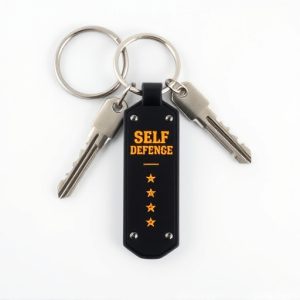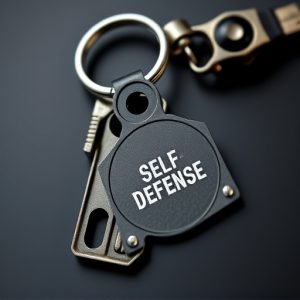Maximizing Market Potential: A Guide to Launching a Self-Defense Keychain Business
The self-defense keychain market has seen significant growth due to its alignment with consumers�…….
The self-defense keychain market has seen significant growth due to its alignment with consumers' focus on personal safety and the practicality of everyday carry (EDC) items. These compact multifunctional keychains come equipped with features like pepper spray, stun guns, alarms, or knives, designed for portability and ease of access. They blend functionality with style to cater to a broad range of users. The industry is characterized by its innovation in safety features while adhering to legal requirements, offering alternatives to more regulated traditional self-defense weapons. Strategic marketing, including digital campaigns, SEO optimization, influencer partnerships, and a mix of online and brick-and-mortar sales channels, propels the self-defense keychain business forward. Companies must navigate complex legal landscapes to ensure product compliance and safety, with ongoing engagement with legal experts to adapt to regulatory changes. The self-defense keychain sector's commitment to quality and customer safety underpins its continued growth within the personal security market.
Exploring the self-defense keychain business presents a unique intersection of personal safety, everyday carry culture, and innovative product design. This article delves into the lucrative market of self-defense keychains, examining consumer demand, product development trends, effective business strategies, and critical legal considerations. Join us as we navigate the keychain self-defense landscape, offering insights for entrepreneurs looking to secure their place in this dynamic industry.
Market Analysis: Understanding the Demand for Self-Defense Keychain Products
The market for self-defense keychain products has seen a significant uptick in recent years, driven by an increasing awareness of personal safety and a growing interest in practical, everyday carry (EDC) items. Consumers are increasingly seeking out compact, versatile self-defense solutions that can be readily accessible without compromising on functionality or style. The self-defense keychain business taps into this demand by offering a range of products designed to deter potential threats and provide peace of mind. These keychains often incorporate features such as pepper spray, stun guns, personal alarms, or slip joint knives, all within a form factor that can easily attach to keys, bags, or even kept discreetly in a pocket.
Market analysis indicates that the appeal of these keychain products lies in their convenience and legal compliance. Unlike traditional self-defense weapons, which may carry stricter regulations, keychain self-defense tools are often more legally permissible across various jurisdictions, making them an attractive option for a broader demographic. This accessibility, combined with the growing trend of empowering oneself through self-defense training and tools, has led to a burgeoning market for these products. The self-defense keychain business is poised to capitalize on this trend by continuing to innovate, offering new models that incorporate cutting-edge safety features while maintaining the compact, user-friendly design that customers have come to expect. With a focus on quality, reliability, and customer safety, businesses in this sector can anticipate sustained growth and demand for their products in the personal security market.
Product Development: Innovative Features and Designs in Self-Defense Keychains
In the realm of personal safety, the self-defense keychain business has seen a surge in product innovation and design, catering to individuals seeking practical and stylish security solutions. These compact tools are engineered with a blend of functionality and elegance, ensuring they serve as both a fashion statement and a means of protection. A notable trend in the market is the integration of innovative features such as alarms, pepper spray, and multi-functional tools like keychain kubotan, which offer users a range of defense options. Manufacturers are focusing on ergonomic designs that allow for easy grip and operation under pressure. The materials used in these keychains often include durable plastics and metals, chosen not only for their strength but also for their resistance to environmental factors. These enhancements ensure that the self-defense keychain remains a reliable companion, whether it’s attached to a purse, car keys, or a backpack. The business is also attentive to incorporating safety features such as key locators and detachable alarms, which add an extra layer of security for users who may misplace their keys or need an audible deterrent against potential threats. As the self-defense keychain business evolves, it continues to prioritize user safety, accessibility, and ease of use, making it an indispensable gadget for urban dwellers, travelers, and anyone seeking added protection in their daily lives.
Business Strategy: Marketing and Sales Approaches for Self-Defense Keychain Ventures
In the competitive landscape of self-defense products, a self-defense keychain business must employ strategic marketing and sales approaches to stand out. The primary objective is to educate potential customers on the practicality and utility of these compact yet effective tools. Digital marketing plays a pivotal role; leveraging social media platforms like Instagram, Facebook, and Twitter to showcase product features through engaging content, including demonstration videos, customer testimonials, and quick tutorials on self-defense techniques using the keychains. Search engine optimization (SEO) is crucial to ensure that the business ranks highly for relevant queries such as “self-defense keychain” and “personal safety keychain.” Collaborating with influencers in the self-defense and personal safety niches can amplify reach and credibility. Additionally, content marketing through blog posts or articles that address personal security tips often incorporate these keychains within the advice, further driving interest and sales.
A successful sales strategy for a self-defense keychain business should focus on accessibility both online and in physical stores. Offering the product through e-commerce platforms not only reaches a wider audience but also allows for customer reviews that can be leveraged to enhance trust and conversion rates. Partnerships with retailers specializing in self-defense gear or general safety products can provide an omnichannel shopping experience, allowing customers to see, touch, and understand the keychain’s functionality firsthand before purchasing. Special promotions, such as seasonal discounts or limited-time offers, can stimulate sales and create a sense of urgency among potential buyers. Tailoring products for different demographics, including variations for children or seniors, ensures the business caters to a broader audience while addressing specific self-defense needs and concerns.
Legal Considerations: Ensuring Compliance and Safety in the Self-Defense Keychain Industry
In the realm of personal safety, self-defense keychain businesses have surged in popularity, offering compact and convenient tools for protection. As these enterprises expand, they must navigate a complex web of legal considerations to ensure compliance and the safety of their customers. One critical aspect is adhering to local, state, and federal regulations regarding the sale and distribution of self-defense products. Manufacturers must stay informed on laws that govern the types of devices permitted for civilian use, as some jurisdictions may restrict certain keychain defense mechanisms like pepper sprays or stun guns. Additionally, businesses must ensure that their products meet safety standards to prevent accidental misuse or harm. This includes rigorous testing and quality control measures to confirm that the self-defense keychains function reliably under various conditions. By prioritizing legal compliance and consumer safety, self-defense keychain businesses can build trust and a positive reputation within the marketplace. It’s imperative for these companies to collaborate with legal experts well-versed in the nuances of self-defense law to proactively address any regulatory changes or potential legal challenges that may arise. This due diligence not only protects the business but also empowers consumers to make informed decisions about their personal safety tools.


